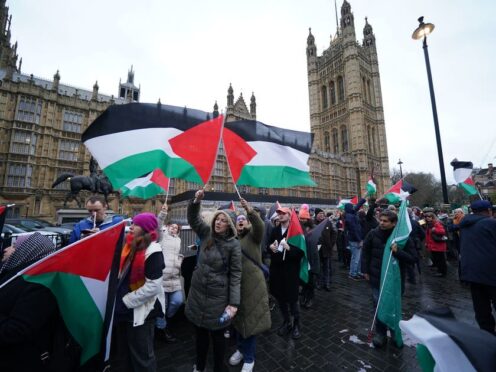Taxpayer-funded bodyguards and cars have reportedly been provided to more MPs amid growing fears for their safety.
A rising number of politicians have been assessed to be at risk and are being provided with close protection by private security personnel, the Sunday Telegraph reported.
Meanwhile, the Sunday Times reported that three female politicians, including representatives of the Conservative and Labour parties, have been given taxpayer-funded bodyguards and cars.
Chauffeur-driven cars and close protection are normally only provided to senior members of the Cabinet and the Leader of the Opposition.
The newspaper reported that the three MPs, who have not been named, had their security upgraded after a risk assessment was carried out with support from the Ravec committee, which is responsible for the security of the royal family and senior politicians.
Prime Minister Rishi Sunak said MPs had been “verbally threatened and physically, violently targeted” in recent weeks as protests were “hijacked by extremists to promote and glorify terrorism”.
The Sunday Telegraph reported that Commons Speaker Sir Lindsay Hoyle has written to the Prime Minister and the Chancellor to seek more funding for the scheme to protect politicians by installing security measures at MPs’ homes and constituency offices.
Sir Lindsay, who has faced calls to resign after going against convention during the SNP’s Opposition Day debate on a ceasefire in Gaza, said his motivation for widening Wednesday’s discussion was fuelled by concern about MPs’ security after intimidation suffered by some parliamentarians.
Security minister Tom Tugendhat told the Sunday Telegraph: “We’ve been reviewing existing security measures for MPs in the wake of the murder of my colleague and friend Sir David Amess.
“The work we’ve done has led to substantive improvements to existing security measures at MPs’ homes and offices, as well as new security measures such as the deployment of private protection officers.”
It comes as the Palestine Solidarity Campaign defended the right to lobby MPs “in large numbers”, amid reports the group wanted so many protesters to turn up that Parliament would “have to lock the doors”.
The group said the issue of MPs’ security was “serious” but should not be used to “shield MPs from democratic accountability”.
Palestine Solidarity Campaign director Ben Jamal said thousands of people were “shamefully” denied entry into Parliament on Wednesday as they attempted to lobby MPs to vote in favour of a ceasefire in Gaza.

He added that the group was not involved in the projection of a “from the river to the sea” message on the building, but was “pleased to see it”.
Mr Jamal said the group “does not call” for protests outside MPs’ homes and believed parliamentarians have a right “to have their privacy respected”.
The Times reported that Mr Jamal told a crowd of demonstrators in the build-up to the protest on Wednesday: “We want so many of you to come that they will have to lock the doors of Parliament itself.”
According to a video obtained by the newspaper, he also urged pro-Palestine protesters to “ramp up pressure” on MPs.
In a statement, Mr Sunak said: “The events of recent weeks are but the latest in an emerging pattern which should not be tolerated.
“Legitimate protests hijacked by extremists to promote and glorify terrorism, elected representatives verbally threatened and physically, violently targeted, and antisemitic tropes beamed onto our own Parliament building.
“And in Parliament this week a very dangerous signal was sent that this sort of intimidation works. It is toxic for our society and our politics and is an affront to the liberties and values we hold dear here in Britain.
“Our democracy cannot and must not bend to the threat of violence and intimidation or fall into polarised camps who hate each other.”
The Government’s political violence tsar has said police should have the powers to “disperse” protests around Parliament, MPs’ offices and council chambers that they deem to be threatening.
Baron Walney, the Government’s adviser on political violence and disruption, said on Friday that the “aggressive intimidation of MPs” by “mobs” was being mistaken for an “expression of democracy”.
